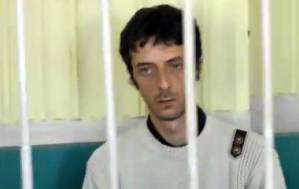Attempt to foist Russian citizenship on Mustafa Dzhemiliev’s hostage son

It has long been clear that Russia has no intention of releasing Khaiser Dzhemiliev, the 33-year-old son of veteran Crimean Tatar leader Mustafa Dzhemiliev. What is new, and extremely disturbing is that the Russian authorities now appear to be foisting Russian citizenship on Khaiser against his will.
Khaiser Dzhemiliev’s lawyer Nikolai Polozov reported on April 28 that the court in Astrakhan had, as anticipated, upheld the refusal to grant parole. Polozov writes that what is unexpected is that Khaiser is on the ex-Federal Migration Service database as a Russian national, and documents have arrived at the prison to issue him with a Russian passport. As reported here, back in March the Ukrainian consul was prevented from seeing him.
Khaiser Dzhemiliev officially rejected Russian citizenship in 2014 and any attempt to force this upon him is in grave breach of international law.
This, unfortunately, has not so far concerned Russia at all, neither in its treatment of Mustafa Dzhemiliev and his son, nor in its annexation and imposition of a repressive regime in Crimea.
Nobody is in any doubt that Khaiser Dzhemiliev is being held hostage as a form of pressure on his father. The world-renowned Crimean Tatar leader who spent 15 years in Soviet labour camps is an implacable opponent of Russia’s occupation of his homeland. Russia banned him from entering Russian-occupied Crimea in April 2014. It has now also issued an arrest warrant against him effectively for trying to enter his homeland. Russia has not been content with repressive measures against the Crimean Tatar leader and imprisonment of his son. On Feb 2, 2016, officials in Russian-occupied Crimea tried to take his grandson, Erol Abdulzhelilov away, supposedly just “for a talk”.
On Feb 2 this year the Memorial Human Rights Centre condemned Russia’s use of Mustafa Dzhemiliev’s son as a hostage and demanded that he be returned to Ukraine. They said that even in the context of the violations of international law linked with Russia’s annexation of Crimea, the fact that Khaiser Dzhemiliev was being held in a Russian prison was unprecedented. There were absolutely no grounds for the Russian authorities to be involved in the case of a Ukrainian national convicted of committing a crime against another Ukrainian in Crimea in 2013.
In January this year Russia formally rejected Ukraine’s application for Khaiser’s extradition, despite all legal grounds under bilateral agreements for returning the young man to Ukraine. He had been taken from Crimea to a Russian prison in Astrakhan a few months earlier, seemingly around the same time that his father initiated the Crimean Blockade. This was almost certainly a reprisal against his father and illegal even according to Russian legislation which stipulates that he should be imprisoned either according to his place of residence, Crimea, or in the Krasnodar region where the trial took place.
In May 2013 Khaiser Dzhemiliev shot and killed Fevzi Edemov who was working as a guard to the family. All the evidence indicated that this was a tragic accident, and that the correct charge should be of manslaughter through careless use of firearms.
It was under Viktor Yanukovych’s presidency that attempts were first made to use the case against Khaiser to blackmail Mustafa Dzhemiliev by threatening to change the charge from manslaughter to murder. These attempts were continued by Russia following its annexation of Crimea.
In the meantime, the Ukrainian authorities passed the case to the Kyiv prosecutor on the basis of the Ukrainian Law on the Occupied Territory. An application to reinstate the original manslaughter charges was allowed, and two Kyiv courts subsequently ruled that Khaiser should be released from custody.
Since these rulings were ignored, Mustafa Dzhemiliev approached the European Court of Human Rights, which on July 10, 2014, ordered Khaiser Dzhemiliev’s release. Instead of complying with the Court in Strasbourg, Russia moved the young Ukrainian to the Krasnodar region in Russia. It also tried to charge Khaiser with murder “out of hooligan motives”, as well as with stealing and keeping a weapon and ammunition.
A Ukrainian court passed sentence in April 2015, with Khaiser’s extradition then immediately demanded, yet ignored, despite all legal requirements under joint agreements being fulfilled.
There was a cheering moment at the end of May when a Russian jury rejected the charges of murder which Russian investigators had insisted on bringing. The jury found Khaiser Dzhemiliev guilty of manslaughter through carelessness and of illegal possession of a weapon, as had the Ukrainian court. It considered that he was worthy of leniency over the charge of possessing a firearm.
The prosecutor ignored this and demanded a five-year sentence which the court obligingly provided. The Supreme Court, however, reduced this to 3.5 years.
There were no grounds for refusing the extradition request and none now for rejecting the parole application. That and these apparent attempts to strip him of his Ukrainian citizenship are now to be challenged at the European Court of Human Rights.





